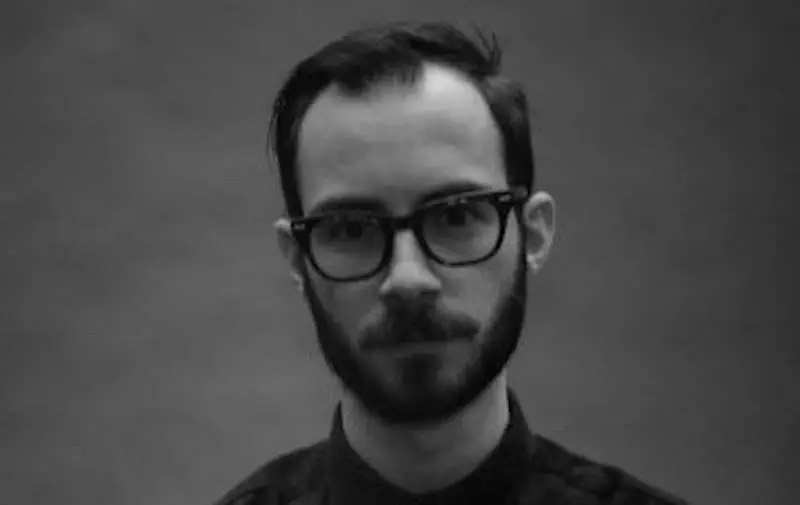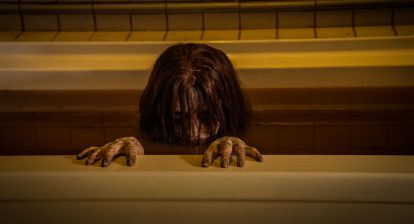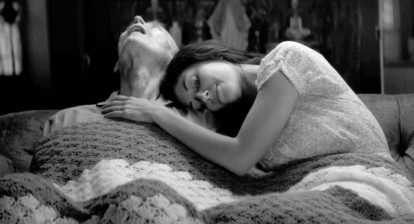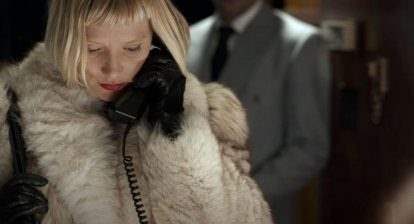Director Nicolas Pesce’s new film Piercing is an adaptation of the Ryu Murakami novel of the same name, the twisting story of a man with sinister intentions who hires a call girl hoping to fulfill his malicious desires, only to fall down a rabbit hole of unexpected perversion. Ahead of the film’s release, Wicked Horror spoke to Pesce about how Piercing simultaneously pays tribute to and subverts the foundation of its influences. Piercing will be in theaters, On Demand, and on DigitalHD February 1st.
Wicked Horror: Right off the bat I wanted to ask what brought you to the Murakami novel and what led you to adapting it?
Nicolas Pesce: I discovered Murakami because of Takashi Miike’s Audition. Love Audition. And realized it was based on a book, read the book and – it was a Murakami book! So I fell in love with Murakami. His books are written like movies. They’re written in the present tense and they are very slick and very much movies. And you can tell he loves movies as a writer. I was reading the book when I was making Eyes of My Mother and felt like that was such a specific movie, and there was this other side of me that’s more playful and has a weird sense of humour that I didn’t really get to showcase in Eyes. So Piercing felt like a great way to do that – a great vehicle to kind of show my more playful side but still get to deal with the dark subject matter that I was doing with my first movie. I tried to make it as quickly as possible while I felt like I could still get away with doing exactly what I wanted.
WH: I definitely noticed the playfulness, especially in comparison to your last film – particularly I’ve noticed your way of using old styles of filmmaking. A lot of people are doing that retro-horror throwback thing. I think you’re doing something more interesting with it, like with the company credits are the beginning of this film. It looks like we’re going to get that film grain, but you subvert that expectation when the visual style of the film is a lot more particular, and slick. So I wanted to ask about the use of the music too – recontextualizing this music from old gialli. What led you to using that music and how did you see it working in the movie?
Nicolas Pesce: Both of my movies are super referential of other styles, other movies, and I think in doing that you always have to strike a very delicate balance of stealing too much from them and – I don’t want to copy other filmmakers, I want to make similar decisions to what they made. For instance, with Eyes of My Mother I didn’t want to make it look like we made it in the 60s, but I wanted – when Hitchcock made Psycho movies were in color and he actively chose to make it in black and white as a stylistic decision. So we made it in black and white, but not like we made it back then.
Similarly, with Piercing a lot of, for instance, the company cards look and feel a certain way to get you in a mood – and now that that look and feel is part of public consciousness you can use that cue to trick someone into a mindset. It’s what the whole movie does: It uses style or genre stereotypes to make you think you know what you’re getting and then delivers something totally different. The style is constantly working to subvert the story. And so with the music, its one of these things where the movie is very inspired by giallo movies but I wouldn’t say its totally a tried and true giallo movie. But the tone of that music – we don’t make movie music like that anymore, big orchestras doing that weird of a soundtrack. Those composers came out of Italy’s take on big band stuff. So these guys were trained in a very different style of music that doesn’t really exist anymore. As much as we tried different styles, there’s something about the quality of that music – the same way the company cards put you in a mindset – there’s a quality to that old music that is not re-creatable, because of the way they recorded it, the technology they had available at the time.
So using the old music and having that quality brought something to the atmosphere of the music that let us not have to worry about putting grain on the movie or making it seem like we shot on film. It’s finding those other ways to bring that spirit and that feeling in without having to do it in a way that everyone does it now.
Also See: Lin Shaye Dishes on The Final Wish and Pesce’s Remake of The Grudge
WH: As you were talking about how there’s this set-up and then subversion of that as the story progresses – I definitely saw the narrative as a subversion of itself.
Nicolas Pesce: Totally.
WH: How we’re watching this story where everything is falling apart, but when it gets revealed we find out this was the pieces falling into place instead. The movie almost becomes a meet-cute when you get to the end – like “oh that’s what I was watching!” Particularly with the comedic element. If you wanted to talk about that comedic element, playing the balancing act of not showing your hand, so to speak, but still making that darkly comedic element work…
Nicolas Pesce: The humor for me comes from these two sources. One, that classic Tarantino thing of juxtaposing mismatched tone music with f**ked up s**t. The music supervisor was Randall Poster, who’s the Steven Spielberg of music supervisors. Having a guy like that helping us find our way with that stuff brings a lot to the tone. But more I think it comes from the tone of the actors’ performances. We talked a lot about everything from Korean movies, like Chan-wook Park and Joon-ho Bong and also Japanese movies like Takashi Miike where these filmmakers have such a weird sense of humor, and they find such an awesome way to handle it.
Particularly Reed, Chris’s character, there’s a lot of Jacques Tati and Inspector Clouseau that’s a kind of refined silliness – in the second half of the movie his behavior is very much dictated by what he’s wearing, and once he’s out of that suit he starts getting a lot more bumbling, very much the kind of 60s / 70s French movie.
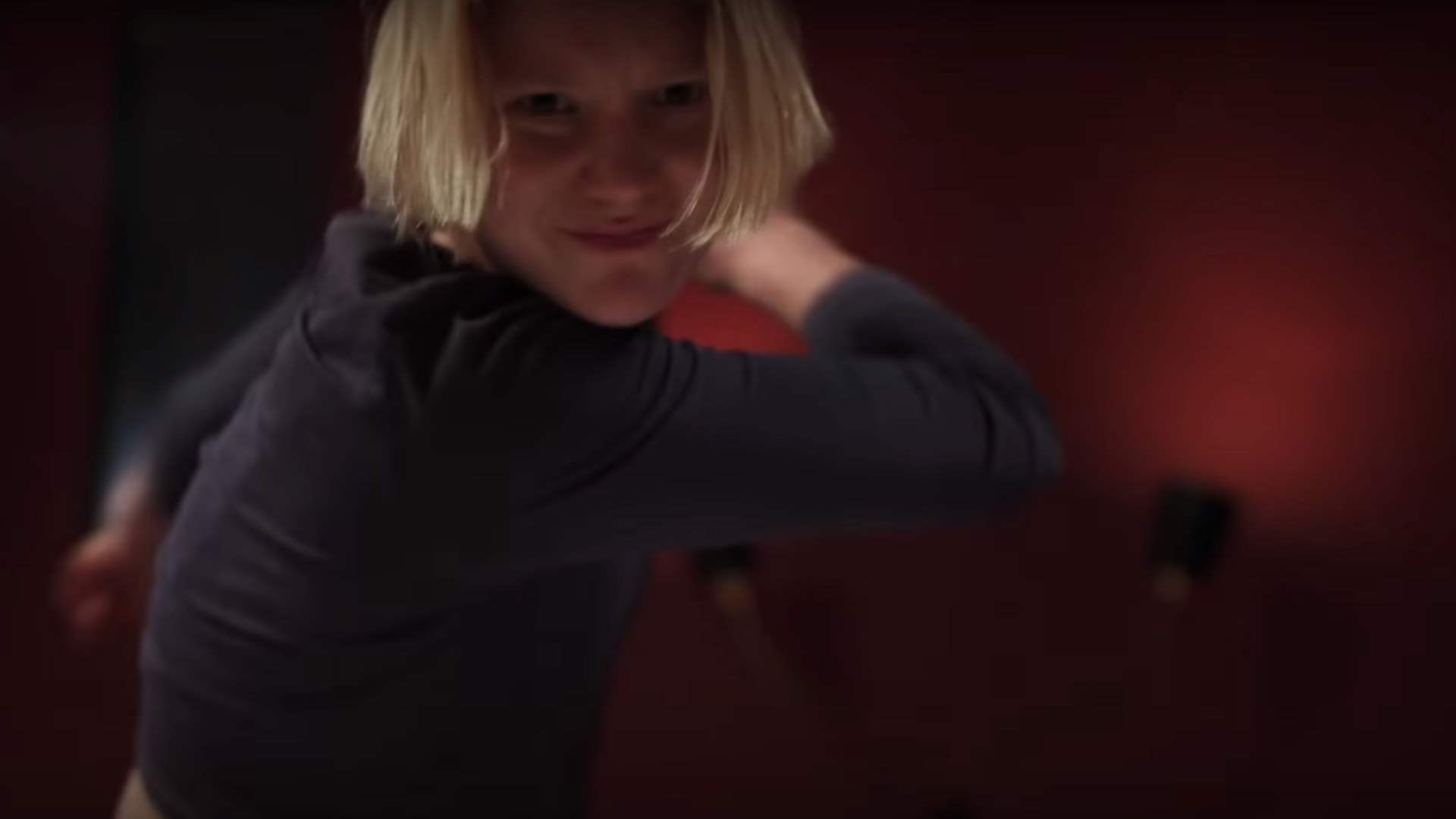
And there’s a lot of Hitchcock. In his time, Hitchcock had an awesome way of bringing in a weird sense of humor. Jimmy Stewart is so unrealistic and not grounded as an actor, but you so buy him as an everyman. It’s such a weird conundrum to watch. We talked a lot about how far Stewart pushes his performances while still being in the world and believable. It’s finding that balance in performance, particularly when it does get serious, but having that tone it’s a testament to the actors and really having a handle on what we’re trying to do and who their characters were.
WH: When you mentioned Tati that made the use of the miniatures click. How did those come into play?
Nicolas Pesce: First of all, I’m so amazed by what Tati did on Playtime, or even Mon Oncle, where he builds his own city. The feeling you get when the city is artificial, and doesn’t have all the detail of real life, is awesome to me. I also saw these photos by this photographer who works primarily in Hong Kong named Michael Wolf. They’re photos of real apartment complexes but they look fake. They’re so dense and geometric.
We were trying to figure out how to capture that feeling. Can we shoot New York City with weird lenses on a drone and get that? No – the way to make it look fake and artificial is to make it look fake and artificial. We have the shoots that are all miniatures and we’ve animated birds and moving cars into them. Any time the characters are in the outside world, all the buildings around them are also miniatures comped into the shots. The world is entirely fake. Every location is a set. We don’t try to hide it. There’s something really really really artificial about everything. But the characters and the world buy into all so it feels real. Yeah, that’s very much what I stole from Tati.
In old movies I love, you had big cities that didn’t exist in sci-fi, like – of course we’re going to shoot it in miniatures! Nowadays, it let’s go find a location and we’ll CG shit on top of it. Like, no – let’s just do it how they used to do it. When they’re in the car it’s rear projection of the miniatures. It’s all clunky, but there’s something about – I always saw the movie as such a fable and a fairytale. It feels like a game you could play with dolls in a dollhouse, so we wanted the world to feel like that.
WH: Before we leave off, I wanted to say thank you for your time, good luck with the movie, and thank you for the movie as well!
Nicolas Pesce: Thank you.
